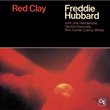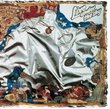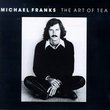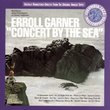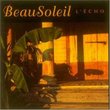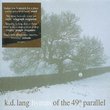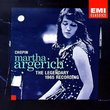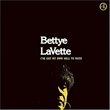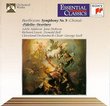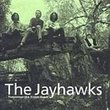| All Artists: VSOP, Herbie Hancock, Freddie Hubbard, Tony Williams, Ron Carter, Wayne Shorter Title: Vsop Quintet Members Wishing: 2 Total Copies: 0 Label: Sony Release Date: 10/25/1990 Album Type: Live Genres: Jazz, Pop, R&B Styles: Jazz Fusion, Modern Postbebop, Bebop Number of Discs: 1 SwapaCD Credits: 1 UPC: 074643497626 |
Search - VSOP, Herbie Hancock, Freddie Hubbard :: Vsop Quintet
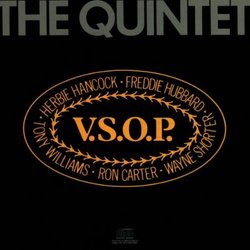 | VSOP, Herbie Hancock, Freddie Hubbard Vsop Quintet Genres: Jazz, Pop, R&B
|
Larger Image |
CD DetailsSimilar CDs
Similarly Requested CDs
|
CD ReviewsAll stars at the height of their powers. Rimantas Blekaitis | Washington,DC | 09/18/2005 (5 out of 5 stars) "This has been a desert island disc for me for as long as I can remember. Can you call this jazz? Can you even call it music? It's something that feels like a whole lot more. This music teems with life, people, thought, emotion, creativity, joy, and insane energy like no jazz I've ever heard before or since. And Ron Carter flat out rocks the bottom out of it on acoustic bass. Give these guys a nobel. The two selections that always kill me are "Jessica" and the hard rocking "Lawra". Jessica features a beautiful arrangement: the bass plays the lovely and poignant melody solo, accompanied by rich, dissonant, single note arpeggios from Hancock which lay out the complex terrain the soloists will then negotiate. Later, the bass is doubled by the trumpet which refines the texture even more. The same group did a poignant and deeply beautiful version of Maiden Voyage on another live album called "VSOP" but that recording exists only on vinyl. Still the live version of Maiden Voyage is available on some compilation CD. Get it and live well! This jazz is not a set of solos with other instrumentalists passively watching. Hancock, the Socrates of this group, pushes the band into a state of musical aporia: he doesn't accompany solos, he questions them, challenging each musician with his absurdly inventive figures; and he's coming with both jazz and modern western musical arguments. And when it's his solo he dives deeply into the darkest part of the woods and then, when you think he's lost, he's emerged out into the bright light. Tony Williams seems to be playing in a state of ecstasy: he pounds new worlds into being and the horns have to dance in his garden or die. Ron Carter rocks out on acoustic bass - he keeps the pulse and he untethers Williams and Hancock to play with the rhythm and meter. Hubbard plays superb and complex music on his solos; Wayne Shorter then steps beyond music and shows us that a horn can be as expressive as natural language." Great album soundwise I. Clark | Sydney, Australia | 01/21/2005 (5 out of 5 stars) "I personally enjoy listening to this album because of it's sound quality. Obviously due to the stellar line-up the improvisation would be good and it certainly exceeds this expectation. But this album goes further. It has the best sound of any live recording I have heard. Hancock's piano can be heard swirling away over every subtle nuance of William's ferocius drumming. Carter's bass is heard amazingly well. I amagine he would have been using a fingerboard pickup aswell as the bridge pickup to get the sound of his bass' deep rumblings. Being a bassplayer myself i am pleased with this outcome. As always the horns of Hubbard and Shorter ring out loud and clear. Overall I recommend that you purchase this album whether you be a fan of Hard Bop, Be Bop, Free Bop or even perhaps Fusion." (4.5 stars) Amazing live album from Herbie and four of his m finulanu | Here, there, and everywhere | 12/12/2007 (5 out of 5 stars) "Some of the best live jazz I've ever heard. For one, let's get a look at our band, shall we? Freddie Hubbard on trumpet, Wayne Shorter on tenor sax; Herbie Hancock on piano; Ron Carter on bass; Tony Williams on drums. Not only is that Miles Davis' old '60s band (minus the leader, who was in retirement at the time - Hubbard takes his place), that's also the same basic group - other than Shorter - that brought us Empyrean Isles and Maiden Voyage. Is that prestigious, or what? This is nowhere near fusion even though Shorter, Hancock and Williams are legends of the subgenre. And that might surprise the Headhunters crowd, but we must remember that before Hancock moved fusion forward he was a post-bop pioneer. And that's pretty much what the group's doing here. Not innovating post bop exactly, but playing it very well, with Hubbard channeling Miles circa 1965 on "Darts". It also contains what may Tony William's best composition: the mutlipart "Laura", with a lengthy drum solo inserted in the middle; and the eerie "Little Waltz", a moving duet dialog Shorter and Hubbard, with Hancock himself playing sweeping arpeggios and eventually a spooky, minor-key solo - followed by an awesome Carter solo spot that often gets so complex it sounds like there are two different basses playing. Meanwhile, there are a few slightly more offbeat compositions, like Ron Carter's odd "Third Plane", where he plays some excellent bass; and "One of a Kind", which has a pretty unique melody. Another good reason to listen to this album is because of the way the group handles soloing. Whenever a member is soloing, the other members play very complex backing to the solos. The last track, "Byrdlike", is about the furthest into hard bop Herbie ever explored, even sounding like Art Blakey, and it's worthwhile - especially for Tony Williams' drumming. The one loser track is "Dolores", which wanders far from the main point and totally loses me. In spite of that little quibble, everyone who has any interest in Herbie Hancock should add this to their shelf as soon as possible and play it as often as they can - it easily ranks with Empyrean Isles, Head Hunters, Maiden Voyage and The Prisoner as one of Herbie's very best"
|

 Track Listings (8) - Disc #1
Track Listings (8) - Disc #1